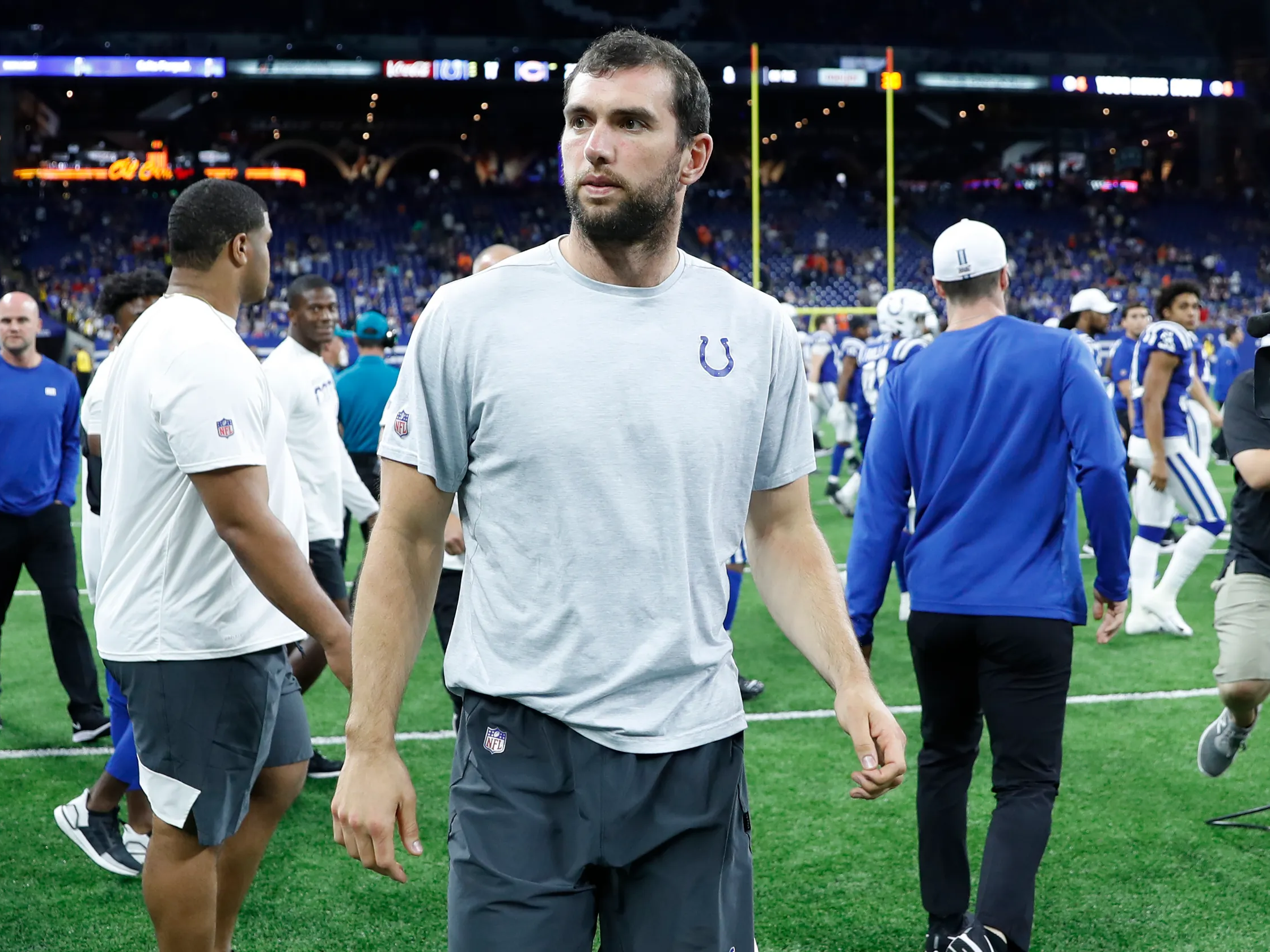Every morning, we run The Narrative Machine on the past 24 hours worth of financial media to find the most on-narrative (i.e. interconnected and central) stories in financial media. On the weekend, however, we run the same analysis on…well, everything else. It’s not a list of best articles or articles we think are most interesting … often far from it. But for whatever reason these are articles that are representative of some chord that has been struck in Narrative-world. And whenever we think there’s a story behind the narrative connectivity of an article … we write about it. That’s The Zeitgeist. Our narrative analysis of the day’s media in bite-size form.
To receive a free full-text email of The Zeitgeist whenever we publish to the website, please sign up here. You’ll get two or three of these emails every week, and your email will not be shared with anyone. Ever.

A chorus of boos echoed through Lucas Oil Stadium in Indianapolis on Saturday.
This was a strange thing.
It was strange because it was a pre-season game. You don’t usually hear boos or cheers of any magnitude at these games. They are low-energy exhibitions played mostly by athletes who won’t make the team.
It was strange because this was Indianapolis. Not Philly or New Jersey, where they’d boo the Dalai Lama just because some guy cut them off in traffic earlier. Or for no reason at all.
Strangest of all, the booing didn’t come after a bad call by a referee. It didn’t come after an especially poor play. It wasn’t a response to poor effort on the field, poor play-calling, or any of the usual reasons for this kind of outburst. It came as the players walked off the field and was directed at the home team’s franchise quarterback – Andrew Luck.
The media had just leaked moments before that Luck had retired at the age of 29, you see.
Andrew Luck retires, appears to be savagely booed by Colts fans in Indy after stunning news breaks during game [CBS News]
The backstory – there’s always a backstory – is that Luck was mentally and physically exhausted after years dealing with and rehabbing from a nagging, persistent cascade of injuries from playing football. A kidney laceration. Torn cartilage in multiple ribs. Concussion(s). Torn abdominal muscles. Torn labrum in his throwing shoulder. And now a lingering strain of something in his calf and ankle. These are just the ones that made the list, things that kept Luck out of games. They don’t include the scrapes, bumps, stingers, bruises, cuts and (probably) more than a couple seeing-stars episodes that he was able to fake the sideline medical staff into ignoring.
No need to deify or lionize here. Luck knew what he was getting into by playing football. He made a lot of money. He’s not asking anyone to shed tears for him. His body and brain were telling him it was time to go, even if it was 10 years before anyone thought he would. And go he did.
Leave aside for a moment that we’re talking about cheering for the color of shirt on a field most associated with the city where we or our parents got offered a job. There might be a couple people who booed Andrew Luck who still revel – or at least still agree – with what they did. But I don’t think it’ll be very many. I think there are a few thousand people who woke up Sunday morning feeling like garbage. I think they’ll remember that they booed one of their favorite team’s best players ever in a special, iconic moment where they should have been cheering. Over time some of those brains will allow ego to overwrite reality with stories like, “It all happened so fast, and we were just responding out of raw emotion”, or “Actually, I was booing because he made his decision so late, when our team couldn’t do anything about it.” Typical brain doing typical self-preservation stuff.
Amid the clamor of a booing crowd, it is easy to convince ourselves that “Andrew Luck deserves our boos” has become Common Knowledge simply because we see a lot of people in our immediate vicinity expressing it. In our social and professional communities built around some shared value, philosophy or idea, we often do the same kind of thing. We would have zero trouble surrounding ourselves with enough people to convince us that the reasons to believe a stock is a long-term zero or that bitcoin is going to a million by 2025 were common knowledge. Doing the same in political sub-communities would be even easier.
You can explain a lot of this as the emotional, behavioral, adrenal response of herd behaviors. Sure.
But the more pernicious effects, and the ones which are usually marshaled in attempts to tell us how to think, are the ostensibly intellectual ones. We really start to convince ourselves that a narrative is at play on which we must act now.
Some days, y’all, it’s just worth remembering: You can’t take it back.


My grandmother was the source of many of the smart things I know today, but they were never presented as “smart” or “ideas” or “philosophy,” they were just “things she said” / experience boiled down to “common sense” (if only) that, when I’ve been smart enough to follow them, have served me very well in life.
Two of them (to be sure, she didn’t invent them, or most of them - but she knew when and how to deploy them) were:
Think before you speak
Never speak in anger or emotion
Just replace “speak” with “booing” and had all the fans just listened to grandma, they’d have had no reason for regret the next morning.
She died forty-plus years ago when the word “narrative” was still reserved almost exclusively for discussions about books, but she would have understood the power of our modern narratives and also how to fight them as she also always said:
And she meant it.
The co-joined narrative at play is to remove all filters from everything you say everywhere, all the time. Lawyers ask client to count to three before answering questions at a deposition. People are now on hair triggers, even less. I carry my CCL hot, in case I ever have to use it, no time to pull back the lever. That’s where we are today; no time for thought and reflection before spewing the most idiotic and ignorant thing you can spew. Luck has courage, Clear Eyes, Full Heart. Just like Johnny U said to remove his name from the Colts record book after Irsay moved the team from from Baltimore in the middle of the night. “I played in Baltimore, not Indianapolis…”
Yep. It’s probably the most common advice I give our sons, too.
Lots of great perspective in this note.
Many of us have been through cycles in our financial and professional life/organizations that have a lot in common with ‘cycles’ or career arcs in pro sports. When the ‘shit’ hits the fan, a lot of pre-conceived notions about the pillars of the professional (mostly) and personal (somewhat) relationships we have are rattled to crumbs. That’s without clear eyes of course. Success can blind people to the states of these pillars. The Dez Bryant circus was tolerable when the Cowboys were winning. That changed hard in 2015. Hard times can bring out the worst some that others would consider their ‘pack’. Clear eyes. Choose your pack wisely.
You are 100% correct, Rusty - YOU can’t take it back. It’s called the Golden Rule for a reason.
“A man’s gotta know his limitations”- Dirty Harry [Magnum Force}.
Funny, but probably most of the crowd jeering at Andrew Luck would be applauding when Clint Eastwood said those lines……
You HAD to do that eh Rusty? “This wasn’t Philly or NJ where they’d Boo the Dalai Lama for cutting them off or no reason at all”
That’s fair and reasoned. Makes you feel better?
Clear eyes, full heart ?
Bah humbug. You just lost one supporter
That 2012 draft class is a fascinating one. You have Luck bowing out because he was never protected and his body and spirit are sapped. RG3 was subjected to maybe even worse “handling” down in Washington… and on the flip-side you have a once in a generation talent like Luke Kuechly probably playing when he should be taking care of is too-often concussed brain. The juxtaposition between him and Luck is fascinating in so many different ways.
I am totally in line with Bob - as a society we are seriously messing up by allowing technology features of texting to drive us to quick-twitch reactive conversations, short-cutting thought with emojis’ and all-cap rants. It’s a struggle to slow down and think before engaging, but if we are to work out how to adapt to hyperspeed many-to-many communications, we all need to do more to resist.
And I also side with Peter; as common or even validated as some stereotypes are, when they are negative we all need to do more to resist their use.
As a lifelong Dallas Cowboys fan and a former resident of Philadelphia, I hereby do not apologize and pledge my sacred honor to redouble my efforts to make very obvious, corny jokes about Philly and Jersey at every possible opportunity.